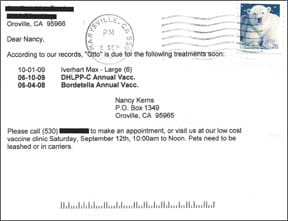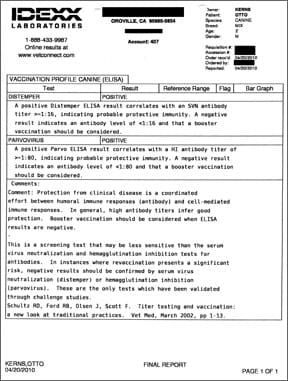VACCINATING YOUR DOG: OVERVIEW
1. Keep accurate records of your dog’s vaccination and titer history.
2. Arm yourself with accurate, credibly sourced information when having a discussion with your veterinarian about vaccine protocols.
3. Consider using antibody titer tests to accurately detemine whether your dog needs to be re-vaccinated.
4. Commit to taking your dog to your veterinarian for annual checkups; consider twice-annual visits for dogs seven years of age and older.
Should you vaccinate your dog? Should your dog receive all the recommended vaccines at once? How important are common shots, like the DHPP vaccine, or rabies vaccine? Over-vaccinating dogs is a definite problem in the veterinary world, but immunizing your pet is nonetheless a necessary part of having one.
You check your mailbox and there it is: a reminder postcard from your dog’s veterinarian. If you’re like many of us dog owners, you groan and toss the card aside.
If you’ve not yet found an enlightened, up-to-date veterinarian, the postcard is likely to say, “It’s time for your dog’s annual vaccinations! Call us today for an appointment!”
We hope, however, that you’ve done your homework and found a veterinary practice whose postcards say something more like, “It’s time for your dog’s wellness examination! Call us today for an appointment!”

What’s the difference? In 2003, the American Animal Hospital Association (AAHA) revised its vaccination guidelines, recommending that vets vaccinate adult dogs only every three years – not annually. Many enlightened veterinarians changed their canine healthcare protocols to reflect the guidelines, and now suggest annual wellness examinations with vaccinations only every three years.
In WDJ’s opinion (and that of the experts we consult), annual vaccination for most canine diseases is unnecessary and potentially harmful. Dog owners should avoid employing those old-fashioned veterinarians who recommend annual vaccines. Owners should also avoid those veterinary service providers who provide inexpensive vaccines and other routine care without the benefit of a relationship with you and your dog beyond a brief transaction in a parking lot or pet supply store. While the financial cost of vaccine clinics may be appealing, the fact is, your dog’s health may pay the price of unnecessary or inappropriate vaccines.
Vaccines for Dogs: The Basics
Core vaccines protect animals from severe, life-threatening diseases that have global distribution. According to the AAHA, core vaccines that every dog should receive initially as a puppy (a series of three vaccines given between 8-16 weeks of age) are:
1. canine distemper (CDV)
2. canine parvovirus 2 (CPV-2)
3. canine adenovirus 2 (CAV)
The core vaccines should be administered one year later, and every three years thereafter, unless antibody titer test results indicate that the dog possesses antibody levels that have been determined to be protective. (For more about titer tests, see
“Dog Vaccination Information“.)
The rabies vaccine is also considered a core vaccine, but should be given once at age 12 to 16 weeks (or as late as local law allows), then again one year later, followed by every three years. (Unfortunately, some locales require rabies vaccination more frequently than every three years, so check your local laws.)
Non-core vaccinations should be administered only to dogs whose geographical location, local environment, or lifestyle place them at risk of contracting each of the specific infections. These vaccines are:
– Bordetella bronchiseptica (kennel cough) & parainfluenza
– Borrelia burgdorferi (Lyme)
– Leptospirosis
Vaccines not recommended, per 2006 AAHA Guidelines are:
– coronavirus (CCV)
– giardia
Note: The above recommendations are per the AAHA. Dr. Dodds no longer recommends the CAV vaccine, and advocates administration ofthe initial rabies vaccine after 20 weeks of age (if allowable by local law).
Be Prepared with Your Dog’s Vaccination History
That said, don’t think for a minute that you need to take your dog to the vet only every three years. It’s imperative that you take your canine companions in for yearly checkups. Rather than throw that postcard in the trash, pick up the phone and call for an appointment. Yearly wellness examinations help our veterinarians develop a good baseline on our dog’s health, be better able to take notice of subtle changes in his health over time, and develop a relationship with our dog and us.
While these annual trips to the vet might now be called “wellness checks” rather than “vaccine visits,” the odds are good that the topic of vaccines will come up. And despite our good intentions, many of us head in with our dog for his annual exam and feel blindsided as the vet suggests an array of vaccines for our dogs. Often, we nod in agreement, get that “deer in the headlights” look and agree with her recommendations (she is the expert after all), then go home with regrets.
Remember the Scout motto and “Be prepared” as you get ready for your dog’s next veterinary appointment. Being prepared means more than remembering to take your dog’s leash, collar with ID, treats, and showing up on time, on the right day, with the right dog. How to best prepare for your dog’s annual veterinary visit and be ready for a discussion on the most appropriate vaccine strategy for him?
- Bring veterinary records and/or a list with you of your dog’s vaccination history; do not assume the veterinary clinic will have all the most recent information, especially if you’ve changed clinics. Other test dates and results to bring include most recent heartworm test, antibody titer test results, and blood and/or urinalysis test results. Ideally, you’ll collect all the data ahead of time and enter into a table so that you have a timeline of the pet’s life.
My dogs’ veterinarian, Susan Wynn, DVM, recommends creating a table with vaccines/yearly wellness test along the vertical axis, with dates along the top. If visiting a new clinic, chances are they’ll want proof that your summary is accurate, so request copies of any previous vet records for your dog’s new file.
- Have a clear idea in your mind whether you want/need your dog to receive any vaccinations (and for which diseases), an antibody titer test, or none of the above. If you are unsure, cultivate a good understanding of the vaccines available. And ask your veterinarian if any particular vaccines are warranted due to conditions in the area in which you live.
- Educate yourself using reputable sources so that you can have an intelligent conversation with your veterinarian on the pros and cons of vaccination for your dog; a good place to start are the AAHA Guidelines. Writings and research by Ronald Schultz, PhD, DACVIM, and Jean Dodds, DVM, are also excellent references.
- Know the status of your dog’s health, and whether he has any health or behavioral issues that your veterinarian should be aware of.
- Bring a list of your dog’s current medications and supplements, including dose, strength, and frequency.
- Have an idea of what the visit will cost, including any tests, to avoid sticker shock or making hasty (bad) decisions based solely on price. Call ahead.
- Be prepared to take your dog and go home if you are uncomfortable with your veterinarian’s recommendations. There’s no need to get nasty or defensive. We suggest something along the lines of, “I’m not sure I’m comfortable with those recommendations. I’d like to go home and think about them.”
If you are going to see a veterinarian who is new to you and your dog, consider making an appointment with the veterinarian, without your dog, to discuss her philosophy toward vaccinations and antibody titer tests.
Educate Yourself About Vaccines
Michelle Kitzrow, of Sugar Hill, Georgia, had a change in thinking regarding vaccine protocols after hearing immunology expert Dr. Schultz speak on the topic (see “Vaccinations 101,” WDJ August 2008). Armed with a new understanding of vaccine protocols, Kitzrow took her then-four-year-old Bouvier, Casey, in to see her longtime veterinarian for Casey’s annual exam.
She admits that it “wasn’t very easy” to convince her veterinarian that, in lieu of vaccinations, Casey should receive an antibody titer test to determine whether she had what vaccination experts regard as a “protective level” of circulating antibodies from past vaccinations. But in the end, Kitzrow’s veterinarian relented, and agreed to take and send a blood sample off to a lab for the titer test.
Kitzrow believes that it was the relationship she already had established with Casey’s veterinarian, along with a new and accurate understanding of vaccines, that helped her veterinarian to support her decision. “He knows that I bring in my dogs regularly for veterinary care, and he trusts me to do the right thing. He also appreciated that I had taken the time to educate myself about vaccine protocols and titers.”
An acquaintance of mine, Diane (name changed at her request), had a bit harder time at the annual exam convincing her veterinarian to check her dog’s antibody titers instead of reflexively vaccinating – despite an 18-year relationship with her dogs’ veterinary clinic and the fact that she takes in her dogs twice a year for checkups. Diane’s 16-month-old Bouvier had received a puppy vaccine series, with the final boosters given after she was 16 weeks of age. The series included distemper, hepatitis (adenovirus), parvovirus, parainfluenza (shorthand for this combination of four vaccinations is DHPP), rabies, Leptospirosis, and Bordetella.

“At my dog’s most recent vet checkup, I requested that only the rabies vaccine be given. I asked that titers be checked for distemper and parvovirus, and I requested a SNAP 4Dx test, which checks for heartworm disease, as well as the most prevalent tick-borne diseases: ehrlichiosis, Lyme disease, and anaplasmosis.
“I declined the combo, ‘all-in-one’ vaccine for distemper, hepatitis, parvovirus, and parainfluenza, as well as the Leptospirosis and Bordetella vaccines. I did not want all of those vaccines given at the same time and hoped that the titer results would show adequate immunity. I was adamant that my dog receive only the rabies vaccine at that time. The vet marked ‘refused’ on my dog’s chart next to the other vaccines she wanted my dog to receive that day.”
Diane understands that Lepto and Bordetella need to be given at least yearly to be effective, but has made the decision not to re-vaccinate her dog for those diseases at this time and understands the risk. Dr. Wynn notes that while we as clients might consider a notation of “refused” on our dog’s chart to be judgmental on the veterinarian’s part, the reason that the vet must note in the file that the client declined vaccination is to limit liability in case the animal is infected with that disease and subsequently blames the vet. (Dr. Wynn assures me that this has happened.)
“In this particular situation, it turns out that my decision to decline all of the ‘recommended’ vaccines, except for the rabies booster, was a good choice as the SNAP 4Dx (checked in-house afterward) indicated that my dog has Lyme disease. A follow-up Lyme Quantitative C6 Antibody Test confirmed an active Lyme disease infection, which means that her immune system was already compromised at the time of the exam. The distemper and parvo vaccine titers showed adequate immunologic response, indicating that my dog was still protected against these diseases, most likely from her previous round of vaccinations.”
In fact, vaccinating a dog who has an active Lyme infection might have been harmful. “It is never wise to vaccinate a dog whose immune system is preoccupied with something else,” asserts internal medicine specialist Nancy Kay, DVM, DACVIM, author of Speaking for Spot: Be the Advocate Your Dog Needs to Live a Happy, Healthy, Longer Life. “The vaccine might ‘distract’ the immune system from the more important task at hand. Also, in theory and for the same reason, the vaccine might not be as likely to create protective immunity.”
Similar to Kitzrow, Diane finds that “Although my dogs’ veterinarian gets exasperated by the decisions I make that are counter to her recommendations, she knows that I appreciate and respect her knowledge and experience. I always ask for her advice regarding my pets’ well-being and do not hesitate to bring my pets to the hospital whenever I have concerns about their health, above and beyond checkups twice a year. She is also aware that I obtain information from a variety of other sources and that I become concerned and wary when there is a real discrepancy or controversy.
“Although she stresses the importance of following her recommendations, she has come to understand that I feel a strong sense of personal responsibility in the decisions made and their effect on the long-term well-being of my pets. If I have serious doubts about a stand that she takes, I will seek a second opinion, elsewhere. On this day, I guess you could say that we agreed to disagree.”
Diane is a little saddened that she and the veterinarian were unable to reach common ground, or at least have a more comfortable dialogue, noting, “It’s important for me to have a good rapport with the vets who care for my beloved pets. It’s important to me that they consider themselves an essential part of a team working for the well-being of the animals. Open communication and teamwork between pet owners and their veterinarians is essential.”
How Antibody Titer Tests May Affect Your Decisions
Antigens are any substance that the immune system identifies as an invader and responds to by producing a chemical defense: antibodies. When everything is working as it should, your dog’s immune system will recognize disease antigens that were introduced to his system via a vaccine (weakened or killed) or by natural exposure to the antigen that causes the disease (viral or bacterial).
A “titer” is a measurement of how much antibody to a certain antigen is circulating in the blood at that moment. The result is usually expressed in a ratio. A positive titer test result is strongly correlated with a good antibody response to either a recent infection or vaccination. A dog who has received “core” vaccines and who displays a positive antibody titer test result should be considered protected from the diseases for which he was vaccinated (meaning, he doesn’t need vaccines at that time). See WDJ blog entry, “Vaccine Titer Tests,” for more insight.
Your dog must undergo a blood draw in order to have an antibody titer test. Labs such as Antech, IDEXX, and most veterinary college laboratories offer these tests. Antibody titer testing is typically run for parvovirus and distemper, since the dog’s antibody response to these two antigens is highly predictive as to the dog’s immunologic competence in dealing with any other antigen to which he has been exposed.
Rarely, there are exceptions. When an antibody titer test is negative, the owner and veterinarian should consider revaccinating and then testing the titers again. It may turn out that the animal simply needed another exposure to the antigen in order to stimulate a stronger immune response. Or, it may develop that the dog lacks the ability to respond normally to vaccines, that is, by mounting a proper immune response. In this case, the owner and veterinarian have gained very valuable information about the dog’s compromised immune status – information they never would have gained by simply vaccinating and assuming the dog was “protected,” as is usually the case with healthy dogs.
Dr. Kay comments, “There are several reasons I can think of why a vet might be loathe to run titers, but of these, I consider only a couple of them to be ‘honorable.'” Two examples she gives are:
- Some veterinarians question the accuracy of titers in terms of accurately assessing immunity.
- If a dog is truly at a high risk of infectious disease, revaccination might be a safer bet than relying on the results of an antibody titer test. She adds, “Very few dogs are truly in this situation, such as those who live in the midst of lots of completely unvaccinated dogs and in a lower socioeconomic setting.”
When I pressed Dr. Kay on the first point, asking what information “Dr. Doe” would have that trumps information provided by someone such as Dr. Schultz, she replied, “You will get no argument from me on this. I suppose that if Dr. Doe professes that titer tests are not accurate, one could ask to see the data that leads him (or her) to this conclusion.”
Although Dr. Wynn adds, “If a distemper or parvo titer is positive, we know that the dog is protected. If it is negative, the dog might be protected, but we have no practical further test to know whether or not it is. Hence, some veterinarians have said the titer isn’t accurate to point out that we don’t know what a negative titer means.” In the case of negative titers, Dr. Schultz recommends revaccination, even though the dog could already be protected.
If You Choose to Vaccinate Your Dog
If you determine that your dog is in need of vaccination, consider the following:
- Ask the veterinarian to perform the health exam and other tests first; you might even wait to vaccinate until those results are in, and schedule a follow-up vaccine visit once you know your dog is in the clear, health-wise.
- Avoid a combination vaccine (five-in-one-type vaccinations) that offers multiple vaccines in only one shot. Note: some veterinary clinics only carry this type of vaccine. We recommend that you look elsewhere for care.
- Do not vaccinate your adult dog more frequently than every three years (unless local conditions suggest a heightened need for Lepto, Bordetella, or Lyme vaccines; these each last a year or less).
- At a minimum, try to schedule the rabies vaccine for a different visit than the other vaccines, if your dog needs them. The rabies vaccine should be administered by itself at a later date, apart from the other three “core” vaccines (distemper, parvo-virus, and adenovirus), and in another part of the dog’s body.
If you’re considering vaccinating simply for financial reasons (because vaccines cost less than running a titer test) a well-planned vaccine/titer strategy might have you coming out ahead in the long run if you scale back on vaccines and run titers on a strategically planned schedule.
Veterinary medicine today has advanced to the point of acknowledging that there is no single “perfect” vaccine program; vaccine programs must be tailored to the specific needs of each animal. Although there is a tendency to want to treat all dogs the same, the program should be designed for the individual, not the masses. The dog’s health, age, environment, activities, lifestyle, and whether he has previously had any adverse vaccine reactions all need to figure in to the equation.
If you encounter a veterinarian who continues to advocate yearly vaccination, schedule a sit-down talk with her, or take your business elsewhere. In Dr. Kay’s book, she notes that a “deal breaker” when choosing a veterinarian is when the clinician “vaccinates dogs for everything, every year.”
It’s Up to You to Make Vaccination Decisions
Don’t expect your veterinarian to ask you broadly what you want to do when you take your dog in for an annual exam. Most veterinarians, unless prompted by the client, will assume that you’re there for “the usual” and will go ahead and recommend annual vaccinations. It is up to you to educate yourself and advocate for your dog and know what vaccines and tests might benefit him, and to know the laws concerning how frequently the rabies vaccine must be administered.
If you and your veterinarian are not on the same page, try having a rational, objective discussion. Put yourself in her position and try to understand her concerns. Take a step back to be sure that what you propose is reasonable. Keep in mind that taking your dog in regularly for annual checkups will help your veterinarian to develop further trust in you and your intentions. If you’ve got a good relationship and you’re armed with the facts, you just might be able to reach common ground.
Lisa Rodier is a frequent contributor to WDJ. She lives in Alpharetta, Georgia, with her husband and two Bouviers, and volunteers with the American Bouvier Rescue League.







What about a stray whose history you don’t have?
I would think a good place to start would be a titer test to see if they have any antibodies present for those vaccines.
A had a 10-yr-old dog that died from immune mediated hemolytic anemia, possibly caused by her vaccinations about a month prior. My current dog is 7 years old and it’s time for all his vaccinations at once. I plan on him having the rabies, as it’s necessary by law, but plan on delaying the other vaccines and asking for titers. How far apart is reasonable, 6 months, less?
My dog died of IMHA from a distemper and rabies vaccine given the month before also. The emergency vet said dogs are vaccinated too much And my dog couldn’t have any more vaccines at all. she wouldn’t do anymore than the one shot, no more boosters on any of her dogs. Wish I would have known the issues vaccines cause and said no, especially distemper! Only rabies from now on and studied have shown that the rabies vaccine can even last 7 years to a lifetime so we dont need to need to vaccinate every three years for rabies either except the law requires it because some vets lobbied to make money. Other vaccines given as a puppy often last their lifetime so I will be doing one vaccine for my dog and no more.
Why does a 20 pound dog receive the same injection as a 100 pound dog? Shouldn’t this be regulated by size?
Because the immune system has a maximum/ceiling/capacity to respond, the dose of the vaccine is to elicit sufficient respond aiming the max. If the dose is too little, it will not trigger the pathway in the immune system enough to elicit a response. Think of it as an On/Off switch.
Let me ask a direct question? Why hasn’t the vaccine industry every done tests on small dogs? As long as industry can perpetuate the one size fits all myth, transparency is avoided. The rabies antibody end point titer over time tells the story and that eliminates every variable there is. There are many factors that create health and on top of that list is immune health, which translates to gut health. It is never one size fits all.
I like what you said about getting a health exam done before vaccinating your pet. My wife and I want to make sure that our dog is as healthy and happy as possible in the coming year. We’ll be sure to look into our options for vets who can help us with this in the future.
Great Article; but, HOW ABOUT AN UPDATED 2020 researched one = or at least 2019.?
I am struggling to find a vet that doesn’t cocktail vaccines. I live in NE GA and currently looking for a vet that will do the single vaccinations on my large breed Dane, not 5-way. Any recommendations????
pay for and have them order from revivial. They carry what they commonly use. Might help educate them. BTW there is an effort to amend the rabies regulations in GA this years. Signup at support titer testing dot com. The new website Titers for Pets dot org will be launched soon.
My 12 year old poodle had rabies and kennel cough vaccines yesterday. This morning, he is walking slowly and acting very lethargic. I called the vet’s office and asked if this is common. The girl who answered said that the vaccines should not have this affect. The only other thing they did was try to empty anal glands internally and pressed real hard because it felt like they needed it. All I can figure is he might be sore from that.
I’ve been a vet tech for over 15 years, vaccines can make our pets lethargic after getting them, some run low grade fevers, also as u mentioned sore in the areas (just like humans) Some become so sore we give an anti inflammatory each year prior to the vaccines to help aid with this (do not give without speaking to your vet office first though. There are only a handful recommended especially with older dogs) also if your dog gets overly stressed going to the vet office combined with age may have wiped them out a bit. If your pet doesn’t seem to improve or gets worse, has vomiting or diarrhea take him in to your vet or after hrs vet. Typically if they haven’t had a reaction with these vaccines over the years, less a % now. However, with your pets age better to be safe than sorry. Hope this helps!!
This VCA Hospital for Pets in Tucson AZ.. Did two bad things. They didn’t tell us that they where going to give three shots in to our small Dogs they just did it with out our knowing it. Another thing they lie to my younger Sister saying they have to have three . But there killing my younger Sister s dog. My Sister never lisions what I say I know it’s dangrues to give that meny to 2 small dogs. Now her dog very sick. My dog don’t act right eather. There’s no one to turn to. I wish my sisters where smart but no. They can not see you have to say no to those other shots. But it’s to late for her dog she’s more sick then better those pills will not get her any better. This VCA place killed my younger Sister s dog .
I am the organizer for the Rabies Titer Bill in Arizona. Please hook up with us. For now use Supporttitertesting.com and sign up for updates. I also have Protect the Pets Arizona but am directing people to focus and support legislation.
VCA hospital in AZ. Should close there doors for good. Why they give 3 shots with out there Pets owners. 2 they lie to them. It’s very dangrues to give all these shots to them I look on line.i saw what happens to small pets they don’t. I say no but yes to 1 shot Rabbies. No to others. I know you people are killing your family pets given way to much shots to them. Never lison what they say. Or your pets will be in there grave before you know it. I’m telling you all the truth I won’t lie. I care for your pets they don’t. My to younger sisters don’t lison what I have to say. They don’t agree what I say. I know better then them. Becouse I look on line I know what’s good for pets even when there small. Mia & Cara you have to lison what I say. It’s way to late for your pets now you have killed them .
Well in Las Vegas stay away from critter care pet lodges etc. criminals .ignorant
No good dangerous bunch of well one should feel in blank after you’ve heard or experienced such behavior behind closed doors ! More from your LV veterinarian s
Several will tell you lol avoid them or you’ll end up joining them .Thank you for the advice And your awareness will be worth it so I’m being told !
Well in Las Vegas stay away from critter care pet lodges etc. criminals .ignorant
No good dangerous bunch of well one should feel in blank after you’ve heard or experienced such behavior behind closed doors ! More from your LV veterinarian s
Several will tell you lol avoid them or you’ll end up joining them .Thank you for the advice And your awareness will be worth it so I’m being told ! This is the first time I’m posting apparently others have taken on to do the same
Some vaccinations in dogs are mandatory, others are optional and recommended depending on the environment in which you live. Always ask your veterinarian about your dog’s vaccination schedules and make sure your dog is up to date with all the vaccinations he/she needs, so that he/she can be in good health
You have to be aware of veterinary clinics ignoring the science. They have depended on vaccine reminder cards. Find a small unincorporated clinic, you will have better luck and they should have an online submission to titer testing at Kansas State Diagnositic Lab. The cost is much less that way.
One of our 2 year old pugs has Autoimmune Hemolytic Anemia.It came out of left field 38-45 days after his DA2PPV vaccine.Our baby was fine up until the month after being vaccinated,now we are fighting to save his life.Please research and titer test your pets.Most veterinarians are only out for profit.